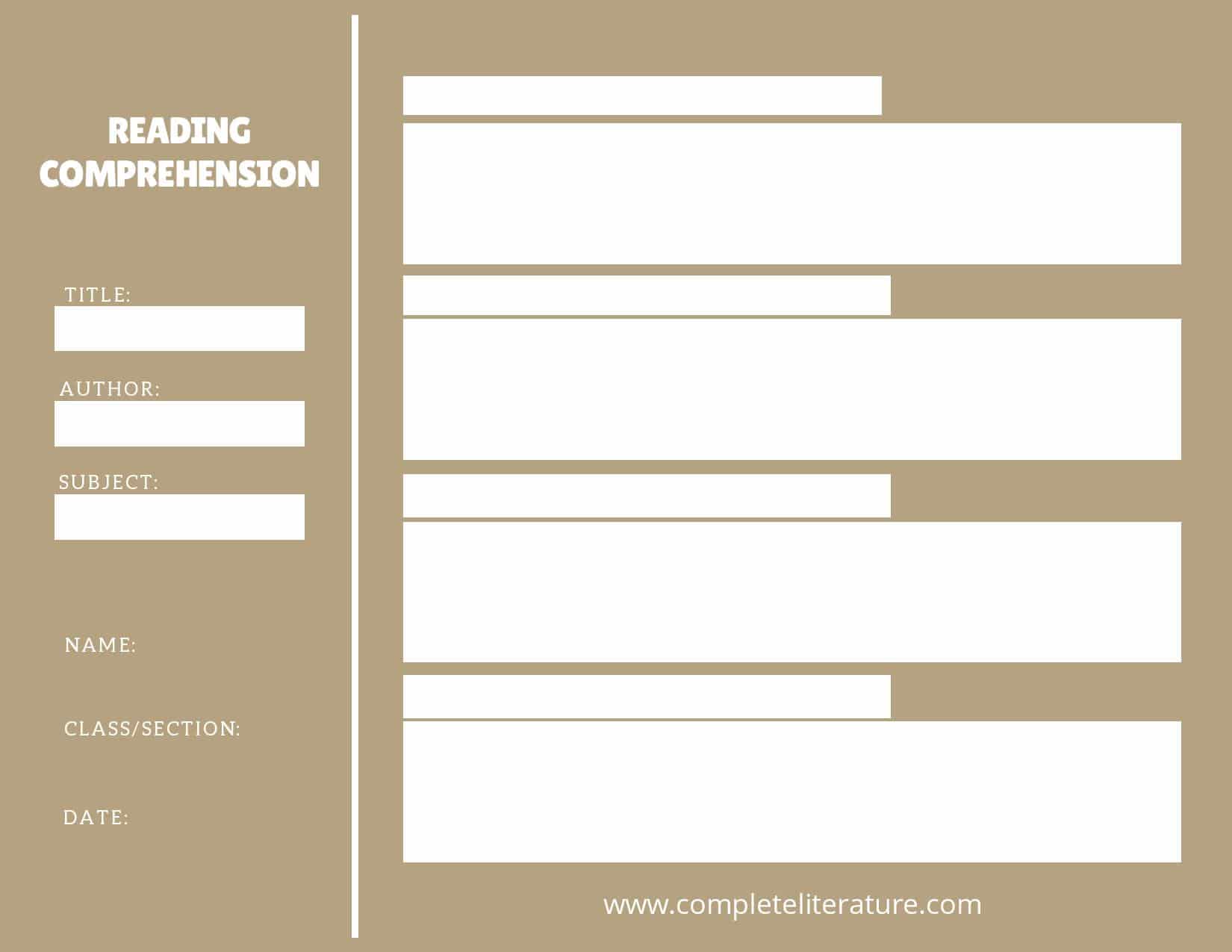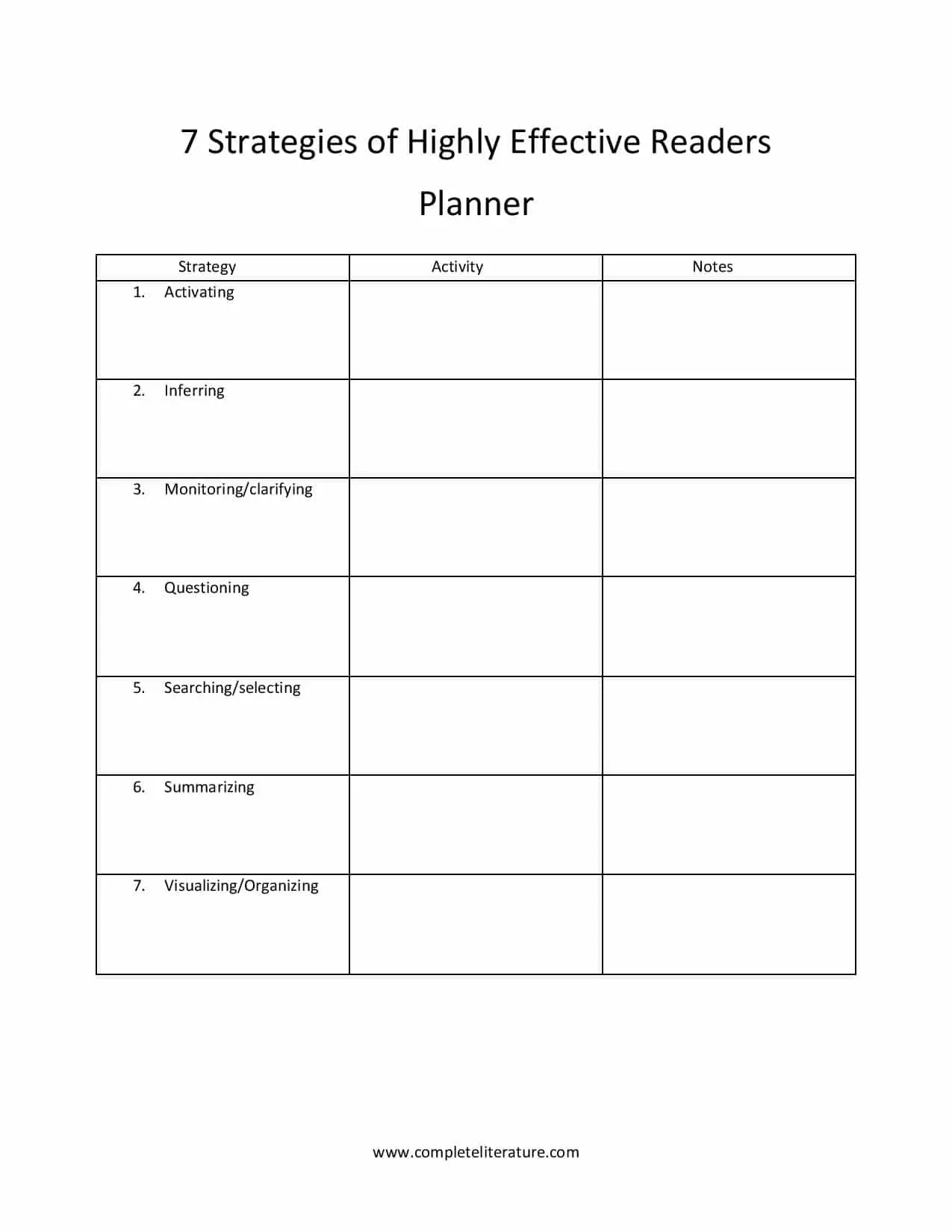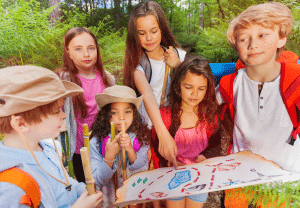According to the Institute of Reading Development, “When skilled readers open up a new book, they jump into reading with confidence and a sense of curiosity. They move through the text easily and at a good pace. They get absorbed in the story, connect it to their own lives, and look at reading as a source of pleasure. Strong readers approach academic reading assignments with the same sense of purpose, actively tracking ideas and making sure they learn important information.” (Read more about what they say here.)
But this kind of skilled reading does not just automatically happen as soon as someone picks up a book.
So what are the 7 strategies of highly effective readers and how do we attain these goals, especially for our middle school students? They are activating, inferring, monitoring/clarifying, questioning, searching/selecting, summarizing, and visualizing/organizing. I will spend time in this article discussing what I learned about each of these strategies.

Table of Contents
Going Back to the Source
First I would like to talk about Elaine K. McKewan. She is the author of the book, Seven Strategies of Highly Effective Readers: Using Cognitive Research to Boost K-8 Achievement.

She was a former teacher, librarian, principal, and assistant superintendent for instruction in the Chicago area before writing over three dozen books for parents and educators based on her wide educational experiences and research over the years. This book is by far one of her best and has the potential to transform every K-8 classroom in America and beyond.
In it, she details how students learn to take command of the texts they are reading through cognition, reading comprehension, and retention. She actually shares actual activities you can implement into your classroom or homeschool that have been proven effective.
While I will be talking about each of the seven strategies of highly effective readers, she actually goes into detail in her book about specific teaching applications that she has developed through her years of research to help readers mature into highly effective readers. If you find this article interesting and informative, you will definitely want to read her complete treatment of the subject.
Who is This Written For?
One final note before I begin: who is this material targeted for? This is not just for struggling readers, but is perfect material for all students in grades K-8. It is valuable information for all readers. Since all readers in K-8 are at differing levels of reading and comprehension, using these principles will help to get the vast majority of your students on the same page. Additionally, they will much more quickly master the other material that you are teaching in your school days.
In fact, I would even add that it is a great program for adult readers who never quite got all the details on reading and who would like to become more fluent and skilled. And finally, I would recommend it for anyone that is learning English as a second language. It is a great way to build reading skills while also learning the nuts and bolts of the English language.
So let’s take a look at each of these strategies of highly effective readers and see how each one will help our students to learn how to put reading to work for them instead of the other way around.
Bonus!
Look for the worksheet to put these principles into practice in your classroom! It is at the end of this article.
1. Activating
Activating refers to tapping in to your prior knowledge of what you are reading. That can be any of the following:
- experiences that are directly related to your reading material
- discussions that you have previously had
- related books that you have read or have been read to you
- classes that you have previously taken that are related to the material
The more you can make connections to what you are reading, the more you will be able to learn as you read. All of the above connections are substantive events in your life that will make it much easier to relate to the information that the students are about to read.
Allow them to take the time to consciously compare it to another tangible even in their life. It will make the material much easier to digest. Finding relationships with our knowledge is a great way to reinforce their reading!
2. Inferring
Inferring relates to reading between the lines. You are going to find that many of your students do not come by this naturally. I know that as a student, I was always afraid to do this. It was because I was afraid my interpretation would be wrong.
One of the best ways to get your students more fluent in this step is to have them do it frequently. You will need to make sure that they are not afraid of being wrong. It is okay if what they are reading between the lines turns out to be different than what they end up finding out upon concluding the reading.
Communicate to them that it is just a process of learning and needs to be developed for them to get better. Therefore, it is just fine for them to be wrong and then learn from that.
They will become quite excited as they start to see the progress they make in learning how to read between the lines effectively. Especially in the middle school grades, you will notice that they are more eager to tell you what they are thinking earlier on than before. And that opens the door to more discussion and ability to relate to your students!
3. Monitoring/clarifying
Monitoring and clarifying the text is basically taking your presuppositions and then comparing them to what you are actually reading in the text.
This is probably going to be a lightbulb moment for many of your students. Have them compare what they evaluated in step 2 to what they are actually reading now in step 3. They will be able to compare what they were thinking to what they actually ended up reading. This is a great evaluation tool.
This is a great time to talk about impressions and how much our impressions can be wrong initially as things unfold.
It is also a great time for you to share a time that your impression turned out to be totally different than the situation. It will be good for them to see that it is all part of the learning process. They need to know it is not designed to be perfect all the time. The key word here is clarifying.
By now, though, they do need to have a pretty good understanding of the text.
4. Questioning
Questioning refers to any gaps that the student has between what they have read and what the author intended for them to understand. This is the time for students to formulate questions based on the knowledge they have so far and what they are not yet sure about.
These questions can be directed toward the author if they have the ability to contact them. But generally the questions will be directed toward the teacher or parent. Another great way would be to direct questions toward peers. If there was a classroom discussion time to do this, you would be amazed listening to the students once they start talking and sharing questions and ideas.
And honestly, the students really enjoy these times of classroom discussion that are geared more toward their thoughts and guiding them. I guarantee they prefer them to listening to a lecture!
Check out this quick video that summarizes the seven strategies of highly effective readers:
5. Searching/selecting
This step is basically backing up the questioning step by finding information that backs up and reinforces what you are learning. It allows students to define any terms that they are still unsure of. And it allows them to solve any problems that they are still having with the text.
Finally, this step gives them the resources they need to gather information to give them a complete understanding of the subject.
This can be done as an individual project. But I really think that allowing the students to work in pairs or groups or even as a whole class will being so much more depth to the project.
6. Summarizing
By now your students will have a very good grasp of the information that they have read and processed. So it is time for them to learn how to sum it all up succinctly and accurately.
This is going to be difficult for younger students who find it much easier to just parrot what they have learned. Learning how to express what you have learned in your own words is a pretty large step in younger education. But once students have practiced this and learned to do it well, they will have a lifelong skill that they will use often and love that they are adept at it.
Practice learning this step in workshops or one-on-ones if you have an assistant or parent that can help you. The personal feedback will help them to learn this concept so much faster. This is especially true if you can show them hands on with something they are currently working on.
Check out my article that goes in-depth about how to teach students to summarize the right way.
7. Visualizing/organizing
This is going to be the most fun part for most students and the one that allows for the most creativity.
They are now going to try to visualize what they have learned. Whether it is a setting, a specific item in the book, a concept, or virtually anything, this is the time for the students to talk about the picture in their head.
This can be a time of crafting, drawing, or any type of creative activity. And you can give the students a choice between several items you come up with or you could even let them come up with an idea that you can sign them off on.
You can also use graphic organizers to help them put this step together. Here is an example of one that you are welcome to print and use:

Conclusion
So these are the seven strategies of highly effective readers in a nutshell. I hope that it really helps your students to see what they are reading come alive as they understand it in a whole new way.
Before we go, though, here is a printable worksheet for the parent or teacher to use to help put these concepts into practice in the classroom:

Source:
Teach the Seven Strategies of Highly Effective Readers by Elaine K. McKewan
For more articles on helping middle schoolers to be better readers, check out the following titles:
10 Excellent Techniques to Help Struggling Readers
How to Foster a Love of Reading in Your Students
13 Best Ways to Help Students who Struggle with Reading Comprehension




To induce to reading, to this wonderful world to travel with the imagination is important. Great and useful strategies.
Very useful post! I think it’s very important as readers (specifically as a student) to be able to summerize what you have just consumed, preferably in your own words. It shows you’ve actually taken in what you’ve read.
I love reading. These are great stages and should be taught in all schools.
This is very informative and useful. I will be using these tips with my little ones.
These are great tips. My boys need a push to do some more reading so I will try these tips
My girls love reading and books… they are too little to do it by themselves though so mama gets to read to them, but I find it so important to enjoy the value of things like reading.
They will grow to love reading because of the time you are spending with them now! Thank you for sharing!
I love these strategies and will be using them with my middle schoolers! Thank you for the great printable resources!
My pleasure!
One of my favorite things to do when reading is to visualize what I’m reading, and imagine myself in the setting.
I do the same! Sometimes I will just stop reading so I can concentrate on what I am visualizing before continuing on. It’s one of my favorite parts of reading. But then I love watching the movie later and seeing how different the movie is from my vision. It is usually drastically different, lol.
These are the same strategies I teach to my first year University students! It’s nice to see that these skills are encouraged throughout primary and secondary school as well!
I’m glad to hear that it is being taught at the university level, Stephanie!
These are great reading tips even for older kids! I find summarising after reading one of the best ways for me to absorb the material.
These are all great tips. School is where i learned to absolutely love reading. Thanks so much for sharing this with all of us!
I use these strategies with my students but as I teach ESL students, they often have real problems summarising due to their limited vocabularies.
I did the same thing for my ESL class–except that I was teaching advanced English to adults. They became adept at it very quickly! Thanks for sharing!
It really comes down to engaging with the text in a way that’s meaningful to you. Finding ways to determine meaning and other great things. I love this though. i work with kids in an after school homework program at the library and I’m going to have to use some of these tools with the kids.
All very true, David! Let me know which methods work the best for your students!
It is so important to me that my kids read! I was a very strong reader growing up, and I has been most useful to me throughout the years, I am good at studying and I believe that came from being a strong reader!?
My daughter is just like me and will read at every moment she can! My son is more drawn to the TV and Computers….. which I allow but an hour before bed he is only allowed to read and gladly he will still read in that time!
You are right, Kay! Being a strong reader definitely helps with study skills and so much more! Thank you for sharing.
I always visualize when I read, usually it is indication of how good the descriptions are as well. I like to sum up books as well so that i can briefly talk about them to my followers but it also indicates that I grasped most of the book
Reading is crucial for understanding. As a Ph.D. student, I have to read all the time. Read, visualize, conceptualize and store the information.
What a great post. I love to read and I hope my 3 boys love it as much as I do. It’s interesting that there are all of these strategies to help students become effective readers. I had no idea..thanks for enlightening me.
When I work with students they often have trouble inferring. I think it’s because they don’t want to get it wrong. Great article!
When I was growing up, I was always so afraid to infer something. I was so afraid of being wrong. So I can agree with your thoughts. As an adult, I have gotten braver, and I have tried to make my students comfortable sharing their thoughts and then working through them, whether right, wrong, or neither. Thank you for sharing your thoughts!
Reading is the best! I’ve always been an avid reader. I always hoped my kids would be too, but they don’t love it as much as I do. But they will read now and again.
Some of my kids love to read and others do not.
I love reading, I always did but before the quarantine, I didn’t have enough time to read. I am getting back into it now and can’t be happier.
I have to say, I might be a little jealous, Chad! The quarantine is helping me get more done around the house, but I am still way over my head in things to do. Someday I will get back to being able to sit and read a book whenever I want.
This a briliant post with lots of useful tips for every book lover. Thanks for sharing this and happy reading!
I love reading, but it’s so hard to make time for it. This post has definitely encouraged me to just do it. Thank you for sharing a great read!
I hope you find books that you absolutely love!
I think my children’s teacher has done a great job at helping my child become an engaged reader. My daughter really loves to read.
That’s awesome! Your daughter will remember that teacher for her whole life. 🙂
Comprehension of what we are reading is very important. And yes, it is still very much subject to one’s interpretation. I like the areas of your tips that requires discussions. I’m pretty sure we’d be surprised at how other’s brains work. This is how we learn more.
Reading is one of the most amazing activities, which can make students develop their immagination and language skills. Unfortunately, less and less of them want to read something in their free time. I’ll try to use your tips to engage my students more in the process of reading. 🙂
I hope it helps, Natalia! Many times students will love reading when they are encouraged to (and when their electronic devices are put away)!
Never before has your blog become ideal for all mothers who are forced to become teachers of their children who study at home. Thank you!
So true Cristina! And nobody ever would have thought the world would look like this right now. I hope they can find encouragement here. Thank you!
LOVE THIS. I really hope my nephew is a reader and I’m totally using these ideas! Thank you!
That’s awesome, Krysten. I know he will love the time spent with you and as he gets older he will see the value of it. 🙂
We are going to practice these tips for efficient reading. Great timing as we’re staying at home now.
Since we are staying at home and catching up on reading, I think we can now practice your tips. Thanks!
These are all excellent tips. Reading is so much more than just seeing words on a page. With these tips, we can teach budding readers (and long-time ones, as well) how to read more effectively
I sure hope so, Brianne! One reader at a time!
This is going to be a big help to me. I’ve never thought about the way I read before. I’m an avid reader, but I’ve never thought about HOW I read.
This is really cool! I would love to hear how it makes a difference in your reading! Thank you for sharing your thoughts, Bill.
I knowe this is geared for students, but I think everyone could get a lot out of reevaluatin the way they read. I’ve never really thought about effective reading and what that means.
I would love to hear how it changes your perspective and reading!
This will help me read articles more efficiently and effectively for future reference
These are great tips! I’ve always loved to read books ever since I was a child, and I hope my kids will take interest in it too!
Very interesting article. Thanks for sharing this. My kid loves to read. I will definitely try practice these tips with him.
You absolutely nailed these strategies. Visualizing and questioning, I do a lot as a reader! Great post, girl!
So thankful for that little checklist for the strategy! You’ve nailed it, spot on 🙂
Ahaha. Thank you for the tips. As a kid, I used to read endlessly, but never tested that great on reading comprehension. Now I know!
This is such an interesting post. I love reading and this is one of the things I consider in making sure that I would understand the context.
Going back to the original source is such an important strategy to own as a strong reader. We can’t believe everything we read!
i love to read so much. these are all very useful tips that i’m sure are going to make it easier for readers to be more effective w/ their time.
Thanks for the tips. These will help me enjoy reading more.
The images grabbed my attention right away, but it doesn’t take away from the information in this post. Very informative and useful, thank you.
Interesting article. I never thought about such strategies. Well, I derive conclusions and like using feelings and vocabulary from what I read. But the rest is learning for me. Will surely work out on it. In fact, it will help in my freelance content writing work.
Reading is so vital, not only as kids learn but later in life as well. It’s great to implement it correctly at the start.
These are real goo tips, for students and readers both.. From a readers perspective I tell you they are really helpful.
I love to summarize and take important keywords. I also practice speed reading. It really helps.
When I was in school I was able to summarize what I read,even if I only read it for a day.
These are great tips. I am an avid reader too. Currently reading 2 books per week. I am glad I came across your blog.
I’m so fond of reading as well as my children, this post will be a great share for them. Thanks
Very inspiring post! The strategy for readers is useful for teachers as well as students, Students and teachers will able to achieve their goal.
What an interesting read. It is surprising how much we can learn and what strategy can be adopted to help us become better readers xx
These are some really useful tips as well as idea. I think I do most of that when it comes to reading. At university is was the way of life.
The bonus worksheet is great! Thanks for putting this together, very helpful.
These 7 strategies of highly effective readers are some of the best! I used a few and now am a better reader and my writing has also gotten better too. Thank you!
Wow those strategies are super interesting and I think that reading is on of the best things for kids to learn.
I didn’t even know there was a strategy to this. I just read.
I think this is a great read for anyone who wants to read better – kids or adults. I know it will definitely improve mine.
I feel like I am in school all over again! haha 🙂 These are all great effective strategies that readers learn and implement when reading. I think writing essays, book reports, etc. Are all great ways to develop these skills.
I need to get that book. One of my daughters struggles with reading. I think it might help!
I’ve never heard of these 7 strategies before but it makes sense! I find myself doing these things when reading something I’m really interested in. I suppose I need to learn how to adapt those skills to things that are more of a “need” to read as opposed to “want” to read.
Encouraging reading means creating people who are free and thinking tomorrow. Imaginative but real and these ideas and steps are brilliant!
Wow wow wow. Such a good article.
I will try to use this tips for teaching my son. He is to small now, so I do the reading.
I’ve always struggled to absorb information especially when I was at university. But I found summarising super helpful!
I agree, these are definitely the strategies of highly effective readers! It’s also, of course, important to teach new readers how to use these tips for the betterment of their own skills.
Such a great and helpful tips to use for an effective reading, I am going to share this with my nieces. Thank you!
These are some great tips. Thank you for sharing.
I think reading is one of the most important skills you need to succeed in life. I wish I appreciated this wisdom at more at a young age. I also like your approach on breaking this down into key strategies as it gives a good basis for encouraging critical thinking.
These are some great ways to get more out of your reading! I’m going to try to utilize these tips!
Kileen
cute & little
This would definitely help my son in his readings. It is good to understand deeply what’s the writer wants to convey.
Reading is so important for our intellectual growth, development of empathy and understanding and so much more! I love that you’re sharing ways to help develop more highly effective readers and ultimately encouraging critical thinking. This is fantastic 🙂
Wow who knew that there are so many strategies to reading, it is amazing and really interesting to know x
Reading has been my saving grace during this pandemic. Reading totally takes my mind off of the awful things gong on in the world at the moment.